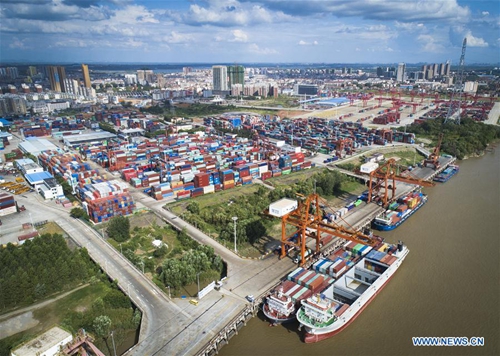
A view of Shenzhen, South China's Guangdong Province Photo: VCG
China's economy faces pressure to maintain 6 percent growth in 2020, but optimism about the economy prevails among leading Chinese economists and China market watchers. They're unfazed by concerns over whether the world's second-largest economy can hold the key level of support or not, the findings of a new poll from the Global Times showed on Monday.
The survey results indicated that views are about evenly split when it comes to maintaining 6-percent GDP growth or embracing a sub-6 percent growth rate.
The poll included respondents from leading Chinese and foreign banks, government-affiliated think tanks, private research institutes and venture capital firms, giving a valuable look inside the Chinese economy.
"There is a high probability that [the economy will grow at a pace] of 6 percent or above," Zhang at CCIEE said.
The chance of the economy slipping below 6 percent would be less than 50 percent, according to Sheng, a former PBC official and currently adjunct professor of economics and finance at the China Europe International Business School. He said that the economy is heading for a rebound next year.
China's economy expanded by 6 percent in the third quarter of 2019, the weakest quarterly figure since 1992 when official records began, official data showed.
As Dong Ximiao, chief analyst at Zhongguancun Internet Finance Institute, put it, the Chinese economy has bottomed out, meaning "there's no room left for economic indicators to move further down, and there are already signs of marginal improvements in the economy."
Those choosing the other side of the coin, instead of voicing pessimism, have favored a market-oriented growth trajectory that may sometimes fluctuate widely, over an obsession with pushing growth into a 6-percent range.
Putting the odds of falling below 6 percent at 80 percent, Hong at BOCOM International said that the structure of the economy has changed with the services sector contributing massively to economic growth.

Photo: Xinhua
Taking GDP numbers to heart is reminiscent of the past when Chinese people lived in a planned economy, he told the Global Times on Monday.
"The planned economy was shown to be dwelling on whether we managed to grow the economy by a certain percentage so as to reach a certain economic size," Hong said, noting that such a mindset goes against market orientation as it risks leading to a substantial resource misallocation.
A numerical approach to economic policymaking ought to be abandoned, argued the head of research at BOCOM International, who forecast that sub-6 percent growth would be normal in years to come.
In a research note sent to the Global Times in late November, Goldman Sachs economists led by Andrew Tilton expected China's economic growth in 2020 to be marginally lower at 5.8 percent compared with 6.1 percent estimated for the whole of 2019.
Wang Tao, chief China economist of UBS, predicted in a note sent to the Global Times in mid-November that China's GDP growth would stabilize at 5.7 percent in 2020 and 5.6 percent in 2021.
Jing Linbo, director of the Chinese Academy of Social Sciences Evaluation Studies, one of the poll respondents voting for a greater than 50 percent chance, said "it's already quite difficult for China's economy, of such a gigantic size, to maintain a growth rate of above 6 percent."
With the economy shifting toward more balanced growth, a slowdown in GDP expansion is a well-accepted scenario, Jing commented.
In the words of Hong, slower growth hasn't and won't become a source of concern.
The nation's transition away from a labor-intensive growth model and toward its thriving internet sector has created a multitude of non-traditional jobs such as individual vendors on Taobao that have yet to be included in the official job market survey, he stressed. Every percentage of China's GDP growth now creates many more jobs than was the case previously.
In another sign of the economy's resilience, the Chinese mainland equity market has posted an impressive performance for the whole of the year, remarked Hong, also chief strategist at BOCOM International.
The Shanghai Composite Index finished up 0.13 percent at 2,875.81 points on Monday. The flagship index had risen by 15.31 percent as of Monday since the beginning of the year.



